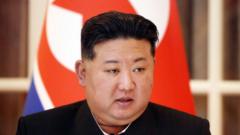In a bold statement, North Korea has condemned the United States' plans for its new missile defense system, referring to it as a catalyst for a potential nuclear conflict in outer space and warning that it could escalate an arms race.
North Korea Warns of 'Nuclear War in Space' Over US Missile Defense Initiative

North Korea Warns of 'Nuclear War in Space' Over US Missile Defense Initiative
Tensions rise as North Korea criticizes US 'Golden Dome' missile shield aimed at countering aerial threats.
North Korea has recently expressed its disapproval of the United States’ ambitious "Golden Dome" missile defense system, claiming that it risks escalating tensions into a "space nuclear war." This defense initiative, announced by President Donald Trump, aims to address evolving aerial threats, such as ballistic and cruise missiles. According to North Korean officials, the United States is exhibiting "self-righteousness [and] arrogance" as it seeks to militarize outer space.
State media reports indicate that Pyongyang perceives this system as a direct threat that could diminish its own nuclear capabilities. Hong Min, a senior analyst at the Korea Institute for National Unification, suggested that if this missile defense system becomes operational, North Korea may respond by developing new military technologies to counteract it.
Over the past year, North Korea has solidified its stance as a nuclear entity, having recently passed a law declaring itself a nuclear weapons state. In addition to conducting missile tests, the North has claimed advancements, including a new intermediate-range ballistic missile with a hypersonic warhead.
In a broader context, North Korea's remarks resonate with concerns raised by China, who has also criticized the Golden Dome initiative. The Chinese foreign ministry warned that the US's self-centered approach to national security undermines the global strategic balance.
While many analysts agree that modernizing the US defense systems is a necessity, the prospective financial burden of the Golden Dome has raised eyebrows. Initial funding of $25 billion has been allocated, but projections suggest costs could balloon by as much as 20 times over the decades. This has introduced uncertainty regarding the feasibility of the project.
As geopolitical tensions continue to mount, the implications of the US missile defense system extend beyond its immediate goal, potentially reshaping global security dynamics and fostering responses from nations like North Korea and China.
State media reports indicate that Pyongyang perceives this system as a direct threat that could diminish its own nuclear capabilities. Hong Min, a senior analyst at the Korea Institute for National Unification, suggested that if this missile defense system becomes operational, North Korea may respond by developing new military technologies to counteract it.
Over the past year, North Korea has solidified its stance as a nuclear entity, having recently passed a law declaring itself a nuclear weapons state. In addition to conducting missile tests, the North has claimed advancements, including a new intermediate-range ballistic missile with a hypersonic warhead.
In a broader context, North Korea's remarks resonate with concerns raised by China, who has also criticized the Golden Dome initiative. The Chinese foreign ministry warned that the US's self-centered approach to national security undermines the global strategic balance.
While many analysts agree that modernizing the US defense systems is a necessity, the prospective financial burden of the Golden Dome has raised eyebrows. Initial funding of $25 billion has been allocated, but projections suggest costs could balloon by as much as 20 times over the decades. This has introduced uncertainty regarding the feasibility of the project.
As geopolitical tensions continue to mount, the implications of the US missile defense system extend beyond its immediate goal, potentially reshaping global security dynamics and fostering responses from nations like North Korea and China.



















